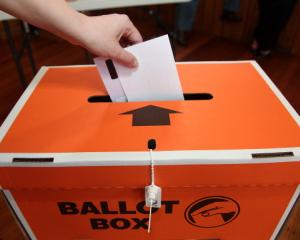Finance Minister Bill English has been widely lauded as the politician of 2013 for his work in overseeing the New Zealand economy.
Forecasts released recently by the Treasury indicate the Crown books will return to a wafer-thin surplus by 2014-15, meeting the lofty aim set by Mr English and Prime Minister John Key several years ago.
Given the significant increase in government debt, the Crown needs to find money to start paying down the $64 billion or so this country will owe by 2015-16.
Even though the Treasury forecasts have been notoriously cautious for many years, there is a general feeling within the business and economic communities that New Zealand is about to start a purple patch of economic growth.
With the economy set to grow by 3.6% in the coming financial year, followed by annual growth of between 2.1% and 2.4% for the following two years, New Zealand's economy may well be the envy of many in the Organisation of Economic Co-operation and Development. Mr English is rated with restoring the Crown accounts to surplus and doing more than his fair share of the heavy lifting on policy by the publication Trans Tasman. The deputy prime minister has driven reform in the state sector to use resources more effectively and deliver higher quality services. In the House, he has become a commanding performer, blunting Opposition attacks.
Mr English has also been resolute in pushing through the partial sales of state-owned energy assets and ensuring the Government sold more of its share in Air New Zealand. It is a certainty Genesis Energy, the last available energy company for partial sale, will be listed early next year, in some form.
In past times of good fortune, government finance ministers have come under strong pressure to try to ensure re-election by making big-spending election promises. Those times have hopefully passed. The importance of having a sound economy, the growing of employment, certainty for businesses and households must overshadow the individual ambitions of politicians.
New Zealand has escaped the fates of countries like Greece, Portugal, Italy and Ireland, which have needed bail-outs by central banks to allow them to pay their bills. The reason why New Zealand escaped is because of an economic fortitude not seen in other economies.
Now, Australia is starting to see a downturn in its economy, evidenced by the number of New Zealanders returning home seeking work. Australian service industries have been struggling for years but the recent downturn in the resources sector is making life difficult for the new Tony Abbott-led government.
Mr English is expected to stare down any attempts to buy votes at the next election, and so he should. The Government will continue to pour money into earthquake-damaged Christchurch and the Auckland housing market. The billions of dollars being spent in those two major catchments will be seen as the Government ensuring it secures the party vote. But it must be remembered National won nearly all of the provincial seats in 2011 and to do that again it must ensure regions are not ignored.
Mr English needs to look much wider than just a focus on numbers as he moves into election year with Budget 2014 firmly in his mind. There are parts of the community hurting from business closures and job losses. There are people struggling to feed their families, despite help from Working for Families and Work and Income. Better-targeted help next year if the economy strengthens will ensure the total population benefits from the work carried out by Mr English. If families cannot pay their rent and feed their families on more than $1000 a week of combined income and benefits, a better understanding of why that happens is needed.
Balancing the budget is important. Taking on less debt is important. Ensuring business confidence leads to job growth is important. Ensuring social justice remains a key part of the country's psyche is important. Mr English knows the challenges. In 2014, he must balance the needs of the Government with the needs of the people.












